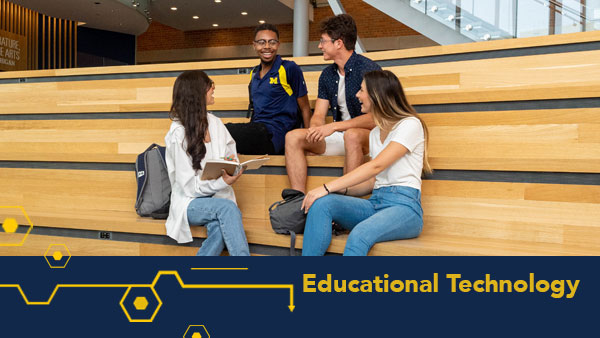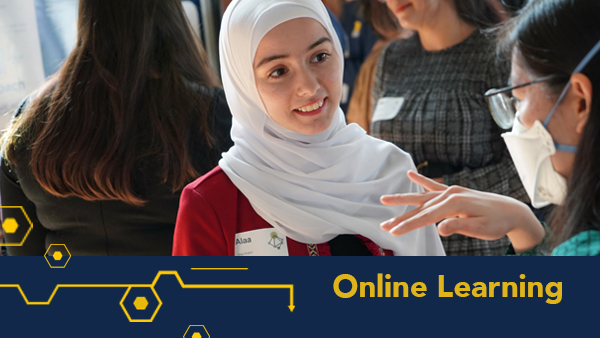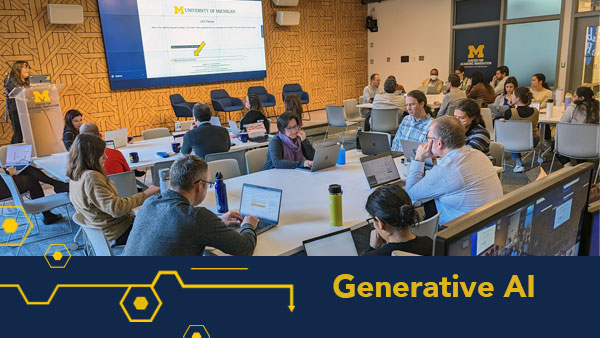Amy Homkes-Hayes, Lead Innovation Advocate
How does the Office of Academic Innovation bring together faculty and staff to participate in reciprocal learning experiences? While we offer faculty and staff a myriad of ways to learn from us and one another, one principal way we convene faculty and staff is in communities of practice. Communities of practice enable the Office of Academic Innovation the opportunity to bring together faculty and staff from across the University to engage in deep learning experiences on salient teaching and learning topics. But before we dig deeper into the advantages of partaking in a community of practice, let’s define one.
What is a Community of Practice?
The Office of Academic Innovation, like many, borrows inspiration for – and guidance from – convening and running its communities of practices based on the seminal work of Etienne Wenger. Wenger’s 1988 book, aptly titled Communities of Practice, outlines its essential features. These include:
- Domain: The topic with which the community convenes around. For us in the Office of Academic Innovation, we pick topics in service of our goals, and of interest to our stakeholders. Recent communities of practice include gameful learning and simulation pedagogy.
- Community: The learners themselves! In strong communities of practice, participants develop constructive relationships where they acquire knowledge from one another and strengthen ties. These relationships form the basis of a culture where they comfortably share ideas with one another.
- Practice: The way in which the community decides the focus of the group. Although the domain may be of general interest to the members, the practice ensures that their specific needs are met. The practice is how the knowledge of the community is constructed and maintained.
What do Members Gain?
In a place as large as the University of Michigan, faculty and staff may sometimes struggle to find others who are invested in developing a teaching and learning pedagogy similar to their own. Places like the Office of Academic Innovation, the Center for Research on Teaching and Learning (who sometimes co-sponsors communities of practice with us) and a handful of others use communities of practice as a way to help faculty and staff with similar interests find and learn from each other. Members gain an opportunity to examine their approach to teaching and learning in a low-stakes environment with others who are equally invested. Communities of practice enable us to tackle tough, but common issues such as using autonomy as a way to foster motivation for learning, or using role-based learning to gain empathy about an actor other than yourself. Members in our communities of practice gain access to people, resources, and an approach to innovative ways of teaching, and meaningful ways of learning.
How do I Join?
Each academic term and year, the Office of Academic Innovation hosts communities of practice any faculty or staff may join. Our current offerings are listed below.
- Gameful Learning Community of Practice: Gameful teaching is a pedagogical approach that takes inspiration from how good games function and applies that to the design of learning environments. Gameful seeks to support students’ intrinsic motivation by building structures for student autonomy, opportunities to demonstrate competency and by facilitating interpersonal connections. This community of practice is designed to engage in meaningful and productive discussion about their use of gameful principles in teaching, including sharing successes and challenges, to help create a more motivational environment for all learners.
- Simulations Community of Practice: The Simulations Community of Practice is an interdisciplinary group of U-M staff and faculty who meet regularly to discuss the development and implementation of simulation-based teaching tools. Participants explore the benefits and challenges of simulation activities, as well as share experiences and resources. All instructors and staff who create and/or facilitate simulation activities for the classroom, or who are interested in doing so, are welcome to attend.
- Public Engagement: A future community of practice focused on public engagement is in the works. Stay tuned for more details.
Stay updated on all communities of practice and other faculty and staff groups by visiting our events calendar.
We are eager to continue to expand our communities of practice in service of our faculty and staff while bringing both our expertise and curiosity to bear in facilitating a positive learning community for those responsible for stewarding students learning experiences.


